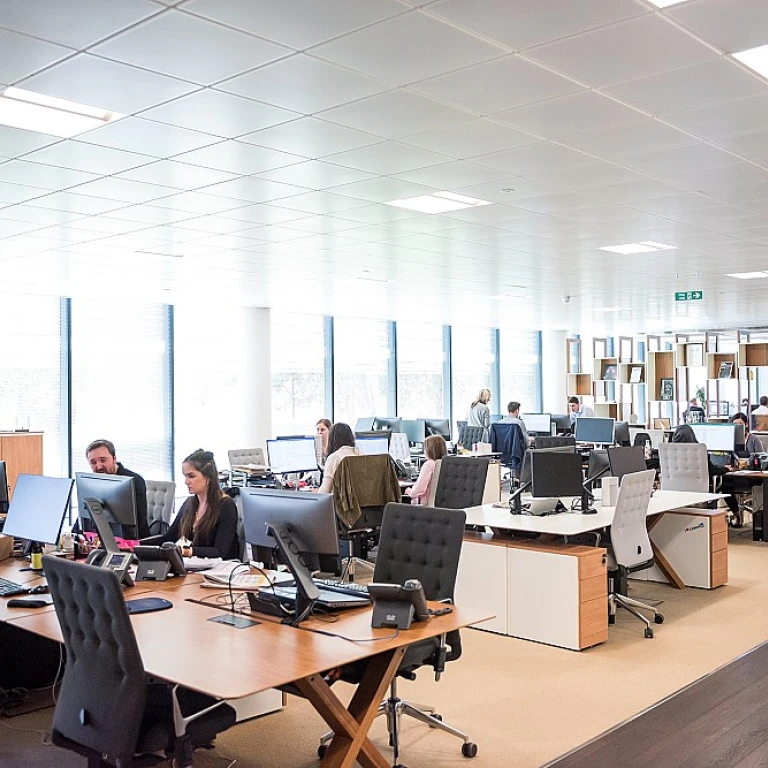Understanding Employee Engagement Today
Grasping the Current Landscape of Employee Enthusiasm
Employee engagement has become a pivotal aspect of modern workplaces, acting as a catalyst for productivity, satisfaction, and retention. In today's multifaceted work environments, understanding the nuances of employee engagement is more critical than ever. It encompasses a wide range of elements, from an employee's emotional commitment to their job and the organization to their enthusiasm for work-related tasks and organizational goals.
Presently, organizations are striving to foster a workplace culture where employees feel valued, connected, and motivated. Engagement is no longer a simple measure of job satisfaction; it intertwines with how effectively employees align with the company's mission and values. This alignment, coupled with open communication, creates a cycle of growth and performance that benefits both the employee and the organization.
While many companies recognize the importance of engagement, challenges remain. The diverse workforce of today requires tailored engagement strategies that cater to different employee segments, including remote and in-office workers. Understanding these dynamics sets the stage for exploring emerging trends, technology's role in enhancing engagement, and the impact of company culture, as we dive deeper into their contributions to the future of employee engagement.
Trends Shaping Future Employee Engagement
Embracing Change in Employee Engagement
As we look toward the transformation of the workplace landscape, several key trends are beginning to redefine what effective employee engagement will look like in the coming years. To create a thriving environment, organizations need to stay ahead of these developments and understand their implications on workforce dynamics.
Flexible Work Environments
Remote and hybrid work arrangements have not just emerged as alternatives but have become staples in the discussion of future work practices. With employees prioritizing flexibility, companies must focus on building engagement strategies that cater to both in-office and remote workers. Emphasizing autonomy, clear communication channels, and regular engagement touchpoints can help maintain morale and motivation despite the physical distance.
Diversity, Equity, and Inclusion (DEI)
Another pivotal trend influencing future employee engagement is the growing emphasis on Diversity, Equity, and Inclusion (DEI) initiatives. Organizations are increasingly recognizing the impact of a diverse workforce on innovation and employee satisfaction. By creating an inclusive culture where every voice is heard and valued, companies can significantly boost engagement levels, fostering a sense of belonging and purpose among their teams. This directly ties into company culture, which profoundly affects how committed and engaged employees feel within their roles.
The Gig Economy and Freelance Workforce
With the rise of the gig economy, a significant portion of the workforce now consists of freelancers and independent contractors. As businesses integrate this agile workforce, finding ways to engage and motivate individuals who operate outside the traditional employment model becomes crucial. Organizations need to adopt flexible, personalized engagement approaches to incorporate freelancers into the company culture effectively.
The evolution of these trends underpins the necessity for organizations to develop dynamic strategies that cultivate engagement across diverse work environments. By understanding these shifts, businesses can pave the path forward, embracing a holistic view that intertwines technology, culture, and innovative practices in crafting a more engaged and enthusiastic workforce.
The Role of Technology in Enhancing Engagement
Unleashing the Power of Technological Innovation
In our rapidly evolving work environment, technology is becoming an integral part of fostering a more engaged workforce. While today we see various tools employed to measure and enhance employee engagement, the future promises even more sophisticated solutions, bridging the gap between human emotions and digital capabilities in entirely new ways.
Artificial Intelligence: The New Engagement Ally
Artificial Intelligence (AI) is poised to play a critical role in the future of employee engagement. By analyzing behavioral patterns and real-time feedback, AI can provide insights that were previously unattainable. Personalized recommendations for training, instant recognition for achievements, and precise engagement metrics are just a few ways AI might transform how organizations connect with their employees.
Virtual Reality: Immersive Engagement Experiences
Virtual Reality (VR) is not only changing how we work but also how employees engage. Immersive training programs, virtual team-building activities, and augmented meeting experiences can bring dispersed teams closer, promoting a sense of belonging and collaboration even when physical presence isn't possible.
Digital Platforms: Building Community and Inclusivity
As digital platforms evolve, they offer enhanced opportunities for building inclusive company cultures. These platforms serve as the foundation for peer recognition, idea sharing, and community-building efforts. Moreover, diversity and inclusion initiatives gain momentum by reaching broader audiences through these adaptable networks, ultimately driving engagement.
Wearable Technology: Insights into Well-being
Wearable technology is set to redefine well-being strategies integral to employee engagement. By providing employees and employers with real-time health data, wearables help track and improve physical and mental well-being, creating a healthier, more engaged workforce. Organizations leveraging these insights can offer personalized wellness programs, encouraging better work-life balance and increasing overall job satisfaction.
By embracing these advancements, companies can create stronger connections, fostering a workplace environment that genuinely values and supports employee well-being and productivity. The synthesis of human intuition and cutting-edge technology will undoubtedly lead us into a new era of engagement. Stay tuned as we explore strategies to further enhance employee engagement and the profound impact that company culture can have in shaping this future.
Strategies to Improve Employee Engagement
Crafting Effective Strategies for Engaging Employees
As we delve into shaping the future of employee engagement, it becomes essential to explore innovative strategies to foster a more involved and motivated workforce. Understanding the connection between a thriving workplace and employee satisfaction forms the core of any successful engagement strategy. Here, we share actionable insights that can enhance engagement and contribute to a more productive organizational environment.
First and foremost, companies must prioritize open communication channels. By encouraging a culture of transparency, employees are more likely to feel valued and heard, which helps build trust and loyalty. Regular feedback loops, like pulse surveys and one-on-one meetings, keep this communication flowing, allowing employees to voice concerns and supply suggestions in real-time.
Another key strategy is offering meaningful professional development opportunities. Investing in continuous learning aligns personal and career growth goals with organizational objectives. Encouraging employees to upskill or reskill not only boosts their personal satisfaction but also enhances the company's competitive edge in rapidly changing markets.
Recognition and reward programs play an equally vital role. Acknowledging employees' hard work and successes, whether through praise, promotions, or tangible rewards, reinforces positive behavior and fosters an environment where employees feel appreciated.
Fostering a sense of purpose can significantly impact engagement levels as well. Employees need to understand how their roles contribute to the larger mission of the organization. By clearly communicating company goals and aligning them with employees' aspirations, businesses can inspire a sense of ownership and passion.
Lastly, promoting work-life balance is critical. With the evolving work culture and increased adoption of flexible working arrangements, ensuring that employees have the means to balance work with personal life can lead to greater overall satisfaction and productivity. Organizations should craft policies that support flexibility, such as remote working options, flexible hours, and emphasis on results rather than time spent at the desk.
Each strategy must be tailored to fit the unique culture and values of the organization, as examined in our analysis of company culture’s impact on engagement. By implementing a combination of these approaches, businesses can pave the way towards a more engaged and committed workforce, setting the stage for future success.
The Impact of Company Culture on Engagement
Culture: The Crucible of Engagement
In today's fast-paced world, there is an inextricable link between the fabric of company culture and employee engagement. Given the importance of understanding current engagement dynamics and embracing future trends, culture remains an enduring influence, shaping how employees relate to their work and the organization.
A vibrant company culture acts as the cornerstone for fostering a sense of belonging and commitment among employees. It sets the backdrop for daily interactions, defining the organization’s ethos and values which, in turn, infuse themselves into every employee experience. Employees thrive in environments where they feel aligned with the company’s mission and shared values.
Moreover, culture plays a critical role in how new trends and technologies are adopted within a company. As discussed earlier, trends such as increased flexibility and the rise of remote work are reshaping what engagement means. A culture that encourages innovation and adaptability is better suited to harness these trends, facilitating a smoother transition and promoting greater engagement.
In nurturing a culture that values open communication, companies can foster transparency and trust, which are pivotal for engagement. Employers should create channels for dialogue and feedback, ensuring everyone’s voice is not only heard but valued. This openness helps to break down the traditional silos and empowers employees, moving them from passive participants to active contributors in shaping the company’s journey.
Lastly, recognition and appreciation are critical in reinforcing a positive culture. Celebrating accomplishments, regardless of how small, strengthens the sense of purpose and community within the organization. Companies that prioritize these aspects often see a ripple effect, resulting in increased morale, productivity, and ultimately, engagement.
As we gaze into the horizon of employee engagement, the impact of company culture will undeniably remain profound. As new challenges and opportunities arise, fostering an adaptable, inclusive, and positive culture will be paramount in ensuring lasting engagement.
Looking Ahead: The Future of Employee Engagement
Embracing New Paradigms for Workforce Engagement
As we've delved into the evolution of employee engagement throughout this article, it's imperative to address the forces that will shape its future. The workforce landscape is ever-changing. This continual evolution requires forward-thinking approaches to maintain and elevate engagement levels. As organizations look toward the future, a few key elements stand out as crucial for their strategies.
First and foremost, understanding today's employee engagement provides a solid foundation for predicting future trends. This comprehension allows businesses to adapt more seamlessly to the rapid changes expected in the workforce. As highlighted, trends such as remote work and increased emphasis on well-being are setting new standards. Companies must remain agile, tweaking their policies and practices to suit these emerging norms.
Moreover, technology will undeniably play a significant role in shaping and facilitating engagement. As discussed, utilizing innovative tools will become more critical in ensuring that employees remain connected, motivated, and productive, regardless of physical location. The integration of artificial intelligence and machine learning might allow for more personalized and adaptive engagement strategies, tailoring experiences to individual needs and preferences.
Furthermore, laying a robust cultural groundwork will be pivotal. As mentioned, culture significantly impacts engagement levels. A forward-looking company culture fosters diversity, inclusivity, and continuous learning, creating a welcoming environment where employees can thrive.
To successfully navigate the future, organizations need to design strategies that are not only responsive to external changes but also align with their internal values and mission. By emphasizing empathy, flexibility, and innovation, companies can secure an engaged workforce ready to meet future challenges.
In summary, the future of employee engagement calls for an integrated approach. Businesses must blend traditional engagement techniques with innovative solutions, underpinned by a culture that values every employee. By projecting this vision forward, companies can prepare for a compelling future of engagement that benefits both the workforce and the organization at large.



